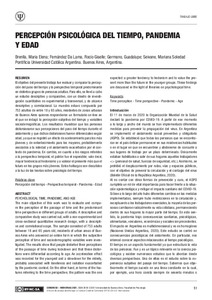Please use this identifier to cite or link to this item:
https://repositorio.uca.edu.ar/handle/123456789/13063| Título: | Percepción psicológica del tiempo, pandemia y edad | Autor: | Brenlla, María Elena Fernández Da Lama, Rocío Giselle Germano, Guadalupe Seivane, Mariana Soledad |
Palabras clave: | PERCEPCION DEL TIEMPO; PANDEMIA; EDAD; AISLAMIENTO SOCIAL, PREVENTIVO Y OBLIGATORIO | Fecha de publicación: | 2021 | Editorial: | Universidad de Buenos Aires. Facultad de Psicología | Cita: | Brenlla, M. E., et al. Percepción psicológica del tiempo, pandemia y edad [en línea]. En: XIII Congreso Internacional de Investigación y Práctica Profesional en Psicología. "Investigación y sistematización de prácticas en el contexto de pandemia y aislamiento social" : 24 al 26 de noviembre. Buenos Aires : Universidad de Buenos Aires, 2021. Disponible en: https://repositorio.uca.edu.ar/handle/123456789/13063 | Resumen: | Resumen: El objetivo del presente trabajo fue evaluar y comparar la percepción
del paso del tiempo y la perspectiva temporal predominante
en distintos grupos de personas adultas. Para ello, se llevó a cabo
un estudio descriptivo y comparativo, con un diseño de investigación
cuantitativo no experimental y transversal, y de alcance
descriptivo y correlacional. La muestra estuvo compuesta por
753 adultos de entre 18 y 65 años, residentes de zonas urbanas
de Buenos Aires quienes respondieron un formulario on-line en
el que se indagó la percepción subjetiva del tiempo y variables
sociodemográficas. Los resultados muestran que las personas
distorsionaron sus percepciones del paso del tiempo durante el
aislamiento y que dichas distorsiones fueron diferenciales según
edad, ya que se registró un efecto de aceleramiento para los más
jóvenes y de enlentecimiento para los mayores, probablemente
asociados a la soledad y el aislamiento exacerbados por el contexto
de pandemia. En cambio, en cuanto a los rasgos referidos
a la perspectiva temporal, el patrón fue el esperable; vale decir,
mayor tendencia al hedonismo y a valorar el presente más que el
futuro en los grupos más jóvenes. Estos hallazgos son discutidos
a la luz de las teorías sobre psicología del tiempo. Abstract: The main objective of this work was to evaluate and compare the perception of the passage of time and the predominant time perspective in different groups of adults. A descriptive and comparative study was carried out, with a non-experimental and cross-sectional quantitative research design, with a descriptive and correlational scope. The sample consisted of 753 adults between 18 and 65 years old, residents of urban areas of Buenos Aires who answered an online form in which the subjective perception of time and sociodemographic variables were investigated. The results show that people distorted their perceptions of the passage of time during lockdown and that these distortions were differential according to age. An acceleration effect was recorded for the youngest and a slowdown for the elderly, probably associated with loneliness and isolation exacerbated by the pandemic context. On the other hand, in terms of the features referring to the time perspective, the pattern was the one expected: a greater tendency to hedonism and to value the present more than the future in the younger groups. These findings are discussed in the light of theories on psychological time. |
URI: | https://repositorio.uca.edu.ar/handle/123456789/13063 | Disciplina: | PSICOLOGIA | Derechos: | Acceso abierto | Fuente: | XIII Congreso Internacional de Investigación y Práctica Profesional en Psicología. "Investigación y sistematización de prácticas en el contexto de pandemia y aislamiento social" : 24 al 26 de noviembre. Buenos Aires : Universidad de Buenos Aires, 2021 |
| Appears in Collections: | Artículos |
Files in This Item:
| File | Description | Size | Format | |
|---|---|---|---|---|
| percepción-psicologica-tiempo-pandemia.pdf | 104,07 kB | Adobe PDF |  View/Open |
Page view(s)
219
checked on Apr 27, 2024
Download(s)
496
checked on Apr 27, 2024
Google ScholarTM
Check
This item is licensed under a Creative Commons License

